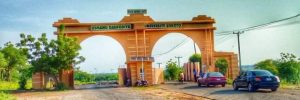By Latifah Bagidi

In the bustling campus life, Usman Yakubu Usman, a 400-level English and literary studies student from Usmanu Danfodiyo University Sokoto (UDUS), felt over the moon like someone who won the jackpot when he heard that President Bola Ahmed Tinubu on 31st July 2023, endorsed the provision of free buses for students in the Nigerian institutions.
However, Usman’s hopes and aspirations for free buses were dashed to the wall when the provision of the free buses remained mere paperwork.
Usman felt disgruntled that the president had made a promise without fulfillment, and the hike in transportation has created difficulties for some Nigerian students.
“I believe if the president pushes for the actualization of his promise, many students like me will be happy. But this seems like the president is not ready for any better reform because there is heavy silence on the promise of buses,” Usman said.
“For example, look at the issue of subsidy removal. It makes students’ lives tense and unbearable. Still no implementation of the promise.”
Speaking with The News Digest Press, UDUS, Fatimah Idera a final year student of Sociology from Adekunle Ajasin University Akungba Akoko Ondo state (AAUA), was also glued with happiness when the president approved free buses for the students on campus.
According to Fatimah, from the onset, she has no belief in the promises of the people in power because Nigerian leaders possess foul mouths with fake promises.
Her words: “We both know that in Nigeria we found ourselves in a country where our government only boasts with its mouth and leaves promises unfulfilled. Meanwhile, I am still wondering why the buses are yet to arrive.
“The failed promises don’t affect me though since I could easily afford my transportation to school without waiting for their buses, so with that, my education has not been affected.”
Sullen Promise, Ebullient Suffering
The necessity of this action was emphasized by the president, citing the escalating transportation costs nationwide as the driving force.
According to a statement reported by The Cable News, President Bola Tinubu, in furtherance of his desire to ease the burden of the fuel subsidy removal on students of higher institutions of learning, President Bola Tinubu has approved the provision of buses to the students’ bodies of all universities, polytechnics, and colleges of education across the country”.
However, several months after the approval, Nigerian students still bask in the ugly bin of suffering. Scorching under the unbefitting garment subsidy removal bestowed on them.
Abdulrahman Abdullahi, a 100-level English and literary studies student from Usmanu Danfodiyo University Sokoto (UDUS), was encircled with happiness upon hearing the approval of free buses by the president.
Abdullahi recalled a conversation between him and a returning student on campus about the increment in the transport fare on campus, which skyrocketed from N50 to N100.
“If I am already using 150 naira as a fee for the bus from the school to the first gate, How much will it cost me to transport myself to the town if I want to refill my gas? I plead with the president to please do something about his promises because the delay of this promise can do more harm to the mental health of Nigerian students who are already going through a lot,”
According to the Punch news on the 15th of August 2022, Nigeria has 219 universities, which is higher than the number of universities in the United Kingdom, a choice destination for Nigerians seeking quality education. Everywhere, it is about quality, not numbers. The National Universities Commission lists 49 federal universities; state governments own 59, while there are 111 private universities.
The National Board for Technical Education tallies 40 federal polytechnics; 49 state polytechnics and 76 privately-owned ones. Federal and state colleges of health stand at 70, and there are 17 private colleges of health. Also, the National Commission for Colleges of Education records 219 colleges of education, most of them owned by the government.
There are a total of 2,168,018 students in Nigerian universities, according to the NUC; 60 percent of them are in federal universities, 26 percent in the state’s universities, and 14 percent or less are in private universities.
Like many other students, Abdullahi Sanusi Abdulsalam, a Demography and Social Statistics student from the Federal University of Birnin-Kebbi, enthusiasm captured his feelings when he knew the promise, but he urged students not to keep hope alive for the promise made.
In his words, he said, “Since we know that a lot of promises end in vain, I can’t advise my fellow Nigerian to give a significant amount of hope to the promises but rather I will advise that we should not give up on our daily struggles.
Speaking further, he stressed that students should then have a wait-and-see mind for it (the promise) since the delay is not a complete denial.
